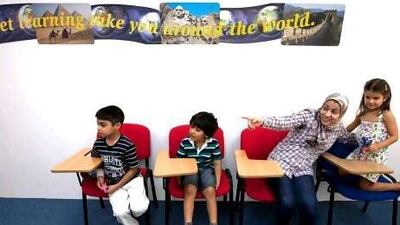DUBAI // Education officials plan to revamp the Arabic curriculum taught to non-Arabs at schools because the existing one is too difficult for new learners.
The Ministry of Education is looking for publishers to develop books that are age-appropriate and improve pupils communication skills in the language.
"The plan is to make it simpler," said Ali Mihad Al Suwaidi, assistant undersecretary of the Ministry of Education.
"Right now, pupils who have no knowledge of the language find it very difficult to cope."
Mr Al Suwaidi said the language was not being given sufficient emphasis at schools and "it is unfortunate that children graduate without learning much. There should be interest in learning it because this is an Arab country."
Pupils in all private schools must study Arabic. Non-Arabs must study it from Grade 1 to Grade 9 as Arabic B. Schools must give lessons four times a week to them. Arab pupils, who need to take Arabic A, learn it six times a week in Grades 1 to 3 and five times a week after that.
Wel Mohammed, the head of the Arabic department at the Jumeirah English Speaking School, said the Arabic books currently prescribed by the ministry were uninspiring for children.
He said: "We try to supplement them to make lessons comprehensible through themes and interactivity. But we would like the ministry to develop more Arabic teaching resources because those are hard to find."
Head teachers at private schools said the curriculum was not the only problem they faced in teaching Arabic to non-Arabs.
A shortage of trained bilingual teachers and a lack of parental interest in the subject were also to blame.
"Most Arabic teachers are used to teaching Arabic to Arabs only," said Dr Samia Al Farra, chief education officer at Taaleem, which operates more than 10 schools in the country.
"For them teaching pupils who are not native speakers is a relatively new concept. Where learners are from different backgrounds, teaching needs to be modified."
She said the variations in sounds, syntax and even the direction of the written language meant different considerations needed to be taken into account when teaching non-native speakers.
The latest Dubai School Inspection Bureau report notes that the degree of improvement in pupils' attainment and progress in Arabic in the last four years continues to be considerably less than in other subjects.
A significant minority of the schools also failed to meet the Ministry of Education's mandatory timetable for teaching Arabic.
A parent of two pupils at the Gems World Academy (GWA) in Dubai said that one difficulty her children faced was that the lesson was conducted entirely in Arabic, with no explanations in English - her family's native language. She added: "So then the children are sitting there and things are not getting into their head.
"The explanation can happen in a better way. Like in French, where their homework has an English translation."
Inspectors said teaching was weaker in Arabic than in other subjects at GWA and that the school did not meet ministry requirements in higher grades.
The mother said her children worked hard at the subject but that many parents were not concerned with their children's progress in the language.
"Parents grumble about the added emphasis on it now. They feel like, if they are here for a while, learning Arabic does not matter.
"And in the UAE, no one needs Arabic for day-to-day activities or work. So there is less motivation."
Ms Al Farra said lessons needed to be complemented at home. "A lot [of parents] argue that they do not speak Arabic. But even having a positive attitude can boost their children's skills."
The British University in Dubai (BUiD) has seen the need for a proper teacher-training model to teach Arabic as a second language.
It has teamed up with international researchers to develop a programme it hopes will be available online in about three years time.
Dr Alessandro Benati, professor of applied linguistics and second language studies at the University of Greenwich, who will be working on the project, said very little research had been conducted on the acquisition of Arabic as a second language.
He said: "Our idea is to see how pupils acquire grammar and other paradigms of learning the language."
Mary Mayall, head of the professional development unit of the language centre at BUiD, said the team will start work in September.
It will include university students, bilingual teachers, a PhD scholar from the UK and Jonathan Featherstone from the Centre for the Advanced Study of the Arab World at the University of Edinburgh.
Dr Amanda Howard, the English language teacher coordinator at BUiD, said various issues would be investigated in developing a teacher training centre.
She said: "We will look at the ground rules and key factors that affect learning of Arabic. Our research will also see how it can be adapted for the various learners."
@ For more on ARABIC LANGUAGE, visit thenational.ae/topics

